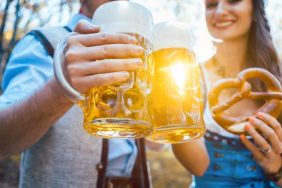When people think of Munich, most of the time their minds go to beer and lederhosen, sausage and really long words, but modern day Munich is an urban playground with everything from art, food, history, culture, nightlife and amazing people. Like all foreign countries, however, there are different cultural norms and traditions that you should know before you book your flight.

Photo by Ernst Kiessling/Flickr Creative Commons
Do your research before booking your flight.
Experiencing Munich in the summer is like going to an entirely different country if you’ve visited in the winter, and vice versa. Winter in Munich is dark, quiet and very cold. Because of this, there are very few locals out and about in the city, as there aren’t very many outdoor activities unless you head towards the mountains for skiing or snowboarding. The exception is during Christmastime, where locals and tourists alike head to the Christkindlmarkt, the oldest Christmas Market in history. There around 15 Christmas markets in Munich, and they’re all worth a visit.
Also: 13 Things to Know Before Going to Oktoberfest
Alternatively, during the summer, the city is alive and colorful with people everywhere. There are biergartens and festivals, gardens and sites to see, and tourists and locals alike venture out to enjoy the sunshine and local culture.
They have public transportation, but it’s not cheap.
The train, metro and bus system in Munich are the epitome of German culture – efficient, clean, fast and always on time. It comes at a price, though, and Germany has one of the highest costs for public transportation in the world. Transportation within the city alone will cost over 6 euro per person, and going to farther neighborhoods can cost as high as 13 euro. If you plan on traveling around for more than a few days, your best bet is a weekly (or monthly) pass, called an IsaCard, which costs around 75 euro per month and gives you transportation to 4 zones.
Munich is not the capital of Germany – Berlin is.
But Munich is the capital of Bavaria, an area in the southeast of Germany with over 12.6 million people. People from Munich refer to themselves as Bavarians first, Germans second, which explains why some Germans in other areas dislike the Munchener population. Bavaria used to be an independent country, which explains the pride. As a tourist visiting their city, don’t mess this up.

Photo by Nadine/Flickr Creative Commons
While you’re at it, know the difference between a biergarten and a wirtsgarten.
A biergarten is one of those awesome outdoor pavilions that are sometimes attached to bars or restaurants where you can self-serve food and drink and get rowdy. A Wirtsgarden, however, is fancier – with tables set with table clothes and waiters and waitresses taking orders. The vibes are different, but you should visit both. Know that no one – tourist or local – needs a reason to go to the biergarten and you should go at every chance you get to experience true Bavarian culture.

Photo by Pixabay
Everything is closed on Sunday.
Sunday is called “Ruhe Tag,” which translates to “day of rest,” but literally means everything is closed. The exceptions are churches, ice cream shops, gas stations and (of course) beer gardens. Aside from that though, you better hope you have food in your Air B&B.
Traveler’s Tip: If you’re on a really touristy street or area, you can find a few cafes or bakeries, but don’t expect freshly baked goods, and they’ll be fewer options as the day goes on.

Photo by Cory Doctorow/Flickr Creative Commons
Biking is the preferred method of transportation.
Everyone bikes.
Quick language lesson: Munich is the Radlhauptstadt which means the capital city of the radl, which is the Bavarian word of Rad, which also means bike. That being said, it’s a biking city first and foremost. For US tourists who are used to having the right of way on foot, you might be shocked to realize that bikes take precedent over any means of transportation, and trust me when I say you will find out quick. Move over for bikes, whether you’re in a car or on foot. They move quick.
Recycling isn’t optional.
Like in Switzerland, recycling is a way of life in Munich, as it is in all of Germany, and even tourists must comply. There are three garbage options in public places: blue is for paper, brown is for organic waste and grey is for “everything else.” Plastic and glass bottles, however, are not to be thrown in any of the bins. Instead, these go into a special machine, usually located inside of supermarkets where you can buy them, and in return you get 10-20 cents, respectively. Haven’t you ever wondered why some of your glass bottles says “non-refundable?” That’s why. “Non-refundable” bottles are the only ones that should be recycled in a bin. It’s only confusing if you let it be confusing.




